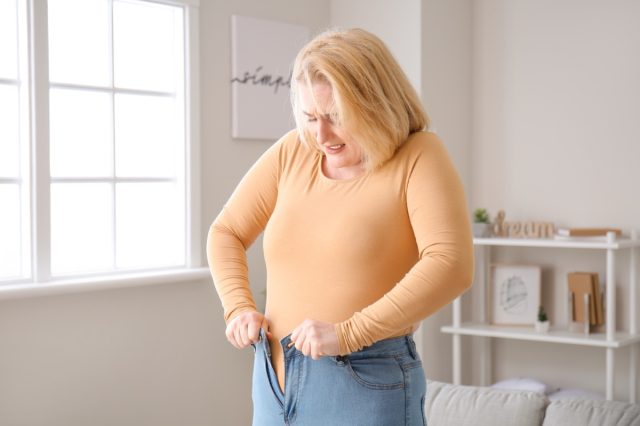Visceral fat is stored deep in your abdominal and it wraps around your vital organs. You may not see it, but chances are it's there. Visceral fat is more dangerous than the belly fat you can pinch because it can lead to serious health issues such as certain cancers, stroke, Type 2 diabetes and high cholesterol. Eat This, Not That! Health talked to several health experts who explained the common causes of visceral fat and how to lose it.
Various Factors

Dr. Jagdish Khubchandani, MBBS, Ph.D. Professor of Public Health New Mexico State University explains, "The leading cause of visceral fat in the US is stress, lack of physical activity, poor diet, and inadequate sleep. Diet and lack of exercise are especially detrimental after the age of 40 and more so in men. We do not process sugars well with age and inflammation and insulin resistance add to the insult causing visceral fat. This type of fat results in premature mortality and number of comorbidities of heart and blood vessels."
Consuming Too Many Calories

Dr. Stacie J. Stephenson, aka "The VibrantDoc", a recognized leader in functional medicine and author of the new self-care book Vibrant: A Groundbreaking Program to Get Energized, Reverse Aging, and Glow says, "Reduce your calories, even just a little. Visceral fat is the first to go when people cut their food intake. Even a modest calorie reduction will burn off visceral fat first. The more you lose, the more your body will also dip into your subcutaneous fat. This is the fat just under the skin that people often want to lose because they can see it, but which is less harmful to health. Multiple research studies have demonstrated that visceral fat gets used first, which may be why health measures improve so quickly, even with just a little weight loss from calorie restriction."
Not Getting Enough Protein

Lindsey Desoto RDN, LD says, "Protein is arguably the most important macronutrient to reduce weight loss and slim your waistline. I suggest getting at least around 25-30% of calories from protein each day to see weight loss and reduce abdominal fat. In addition to promoting satiety, protein is a thermic food, meaning your body burns more calories by simply digesting protein compared to other foods."
Not Getting Adequate Sleep

Sleep quality is differentially related to adiposity in adults – ScienceDirect, says Stephanie Hnatiuk RD, CDE, PTS . "Being sleep deprived can lead to higher levels of visceral fat. This can be due to elevated cortisol levels (our primary stress hormone) which contributes to visceral fat storage, or the fact that sleep deprivation can also increase our appetite and food cravings, particularly for higher sugar foods. Basically, we're likely to eat more calories when we're sleep deprived and those excess calories are more likely to be stored as visceral fat. To avoid this and reduce visceral fat, aim for at least 7 hours of sleep per night."
Slow Metabolism

According to Dr. Sherry Ross, MD, OB/GYN and Women's Health Expert at Providence Saint John's Health Center in Santa Monica, CA, "After the age of 40, our metabolism starts to slow down as we age, which means we burn less calories and we naturally start to lose muscle. If you want to prevent that, it means you need to start to modify your routine by eating less and exercising more. Eliminate some of the discretionary calories during your day – like dessert OR wine instead of having both. Think about either increasing the amount of your exercise or to be more efficient, increase the intensity. Look at changing up your exercise routine and including some high intensity interval training (HIIT) as a way of raising your game."
Alcohol Consumption

"Alcohol consumption does have an association with fat in your midsection," Julie Bednarski MHSc, PHEc, RD Founder / CEO Healthy Crunch states. "Moderate to high alcohol intake is associated with bigger waist circumference and weight gain due to: increase calorie and sugar intake within alcohol-based beverages, stops your body from burning fat, leads to greater hunger and less satiety (i.e. feeling full), and causes poor food choices."
No comments:
Post a Comment